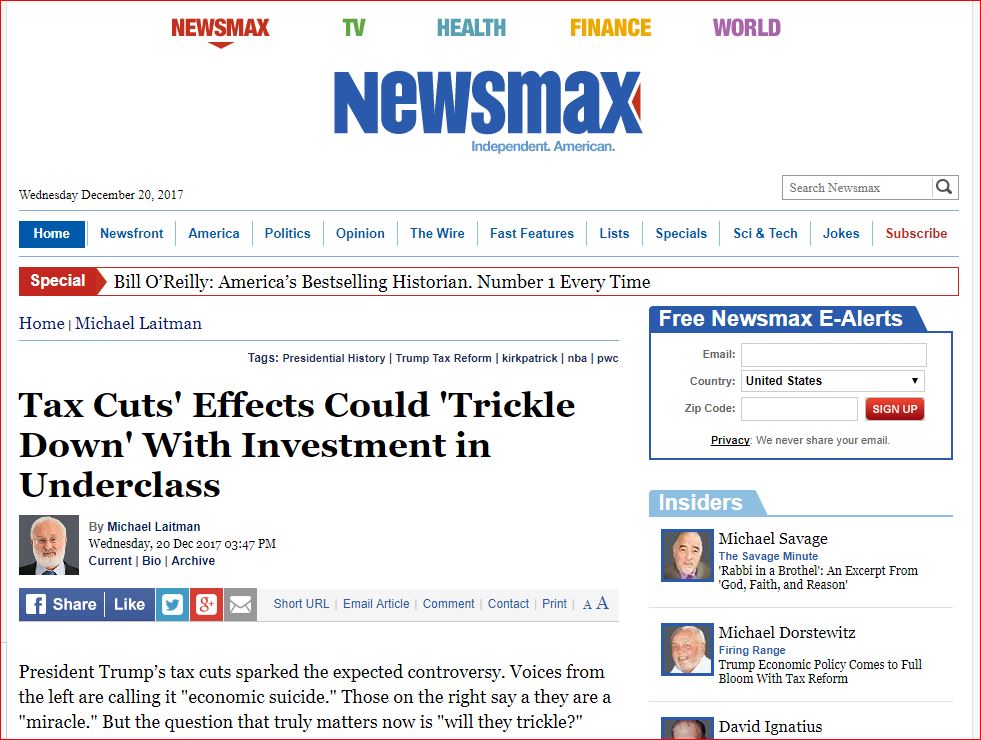
President Trump’s tax cuts sparked the expected controversy. Voices from the left are calling it “economic suicide.” Those on the right say a they are a “miracle.” But the question that truly matters now is “will they trickle?”
To answer the tricky “trickle question,” I believe we need to look beyond economic theory, and take human nature and social values into consideration as well.
The Economic Incentive
“Trickle-down economics” is the idea that the more wealth there is in the upper class, the more business investments will be made to grow the economy and thus benefit the middle and lower classes as well. However, criticism on this idea mounts as the data seems to paint a different picture.
For instance, Forbes contributor and Founder of Wendell Charles financial services firm, Evan Kirkpatrick, concludes that the data on tax rates and economic growth since 1945 shows no correlation between lowering tax brackets and increased economic activity.
In parallel, the rapidly spreading trend of automation in businesses raises a big question with regard to future investments in human labor, since the cost-efficiency ratio of applied automation is continuously rising. A recent PwC study suggests that almost 40 percent of jobs in the U.S. could be automated by the early 2030s.
So from a quick look at history and speculation into the future, the economic incentive for wealth to trickle down from the top seems questionable, hence the criticism on Trump’s tax cuts. But what about an incentive that is not purely economic? Is it possible to incentivize the wealthy to make investments that benefit the lower classes, even if it doesn’t increase their bottom line directly?
The Social Incentive
From a sociological perspective, when the wealthy gain more zeroes in their bank account, they gain something beyond material profit. They gain social status, because the financial game is played in a way that turns the accumulation of wealth into a goal in and of itself.
While many upper class players and individuals don’t necessarily need a tax cut, they won’t say it, because they still want it. And it is not more economic freedom they’re after — it’s social status.
Would any of us behave differently in their shoes? Based on our psychology, absolutely not. Think about the super-rich like NBA superstars. They will constantly strive to score more, because that’s the game everyone around them is playing, a game which is respected by the rest of society. Both the super-rich and the NBA superstars embody our social nature as human beings.
But what would happen if we provided the upper class with the same incentive to invest in society? What if our society played a different kind of game, where he who contributes to the wellbeing of society is the one who “scores” the most?
As social creatures, shame and honor shape our social behavior more than anything else. If we turned social contributions into a supreme value in our culture, then our cultural heroes would be those who embody that and we’d put a whole different spin on competition in society.
Rather than competing for more zeroes in our bank account, we’d be competing for and measured by making the greatest positive impact on society, through investing in science, education, medicine, infrastructure or anything that contributes directly to making the whole of society prosper.
To acknowledge the potential impact of social recognition, just think about the recent “#Me Too” campaign denouncing sexual misconduct, and think of what would be the results of a campaign similar in its intensity, but putting the spotlights on those who systematically hoard extreme wealth and avoid contributing to society. Surely, that’s an extreme scenario, but it makes it easy to see how a shift in social values can happen.
We have to cultivate a culture that encourages social contribution, breeding givers — not by force or regulation — but through better activating our social nature. In other words, if we want to make sure that “trickle-down economics” works, we have to couple it with “bottom-up humanity.”
Featured in Newsmax